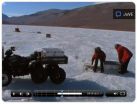Discovery of missing links for Salmonella's weapon system
Scientists have discovered multiple gene switches in Salmonella that offer new ways to curb human infection
2012-04-24
(Press-News.org) Scientists have discovered multiple gene switches in Salmonella that offer new ways to curb human infection. The discovery of the mechanisms of gene regulation could lead to the development of antibiotics to reduce the levels of disease caused by Salmonella. The breakthrough was made by Professor Jay Hinton, Stokes Professor of Microbial Pathogenesis, Trinity College Dublin and his research team* and has just been published in the leading journal Proceedings of the National Academy of Sciences (PNAS). Science Foundation Ireland funded the research.
Salmonella causes food poisoning and kills around 400,000 people worldwide every year. The bacteria are particularly effective at causing human infection because they can survive a series of harsh conditions that kill most bacteria including strong acids in the stomach and the anaerobic and salty environment of the intestine.
"It's a decade since we discovered the Salmonella genes active during infection of mammalian cells," said Professor Hinton. "Now we have found the switches that control these critical genes. My team has gained an unprecedented view of the way that Salmonella modulates the level of the weapon systems that cause human disease."
Salmonella bacteria use a variety of proteins that act as weapons to hijack and attack human cells. Despite many decades of research throughout the world, little was understood about the way that Salmonella genes that control this weapon system are switched on. Now Professor Hinton's team has used a new approach to identify the switches of the Salmonella Typhimurium genes. The exciting new findings show that Salmonella bacteria have more than 1,800 switches, called 'promoters' and reveals how they work.
Understanding how Salmonella switches on its genes should aid the discovery of new antibiotics that will knock out the weapon systems of Salmonella and stop the bacteria causing infection.
The researchers also identified 60 new RNA molecules, called 'small RNAs'. Some of these can actually override the switches of Salmonella genes.
"Just five years ago, we didn't realise that small RNAs played such an important role – or that the switches of so many Salmonella genes were controlled by small RNAs. Identifying these small RNAs could lead to completely new ways to prevent bacterial disease, but this will take at least a decade, " said Professor Hinton.
Professor Hinton's team worked in collaboration with the Wellcome Trust Sanger Institute and the University of Würzburg, and used several cutting edge techniques during the project, called chip-chip and RNA-seq. "I think one reason that our findings are making such impact is that this combination of the new technologies has not been used before for a bacterial pathogen" says lead author Dr Carsten Kröger.
INFORMATION:
Professor Jay Hinton is available for interview contact, hintonj@tcd.ie/ +353-(0)86-0233615
For further media queries contact TCD Press Officer, Caoimhe Ní Lochlainn, tel: +353-1-8963606
Notes to Editor
The research was led by scientists at Trinity College Dublin, and involved the following collaborating institutions: Institute of Food Research, UK; University College Dublin, Ireland; University of Wurzburg, Germany; Wellcome Trust Sanger Institute, UK; Technical University of Denmark.
Salmonella Facts:
Since the beginning of the 1990s, strains of Salmonella enterica sv. Typhimurium resistant to a range of antibiotics have emerged and are threatening to become a serious public health problem, particularly in developing countries.
Symptoms of salmonellosis (food poisoning caused by Salmonella) are fever, headache, abdominal pain, diarrhoea, nausea and vomiting, and are usually self-limiting after a week. In some cases, particularly in the young and very elderly, dehydration can become severe and life threatening.
Salmonella Typhimurium can be found in a broad range of animals, birds and reptiles as well as the environment. It causes food poisoning in humans mainly through the consumption of raw or undercooked contaminated food of animal origin - including poultry, eggs, meat, and milk, and also salad vegetables.
Full title of Proceedings of the National Academy of Sciences (PNAS) article: "The transcriptional landscape and small RNAs of Salmonella enterica serovar Typhimurium"
END
ELSE PRESS RELEASES FROM THIS DATE:
2012-04-24
Since the 1930s, there have been 75 documented episodes of malaria resurgence worldwide, most of which were linked to weakening of malaria control programs, finds a new study published in BioMed Central's open access journal Malaria Journal. The study, which is allied to the theme of this year's World Malaria Day (25th April 2012) "Sustain Gains, Save Lives: Invest in Malaria", found that the most common reason for weakening of malaria control programs was funding disruptions.
There are over 200 million cases of malaria each year with 85% of all cases being children ...
2012-04-24
Seattle, April 24, 2012— Rotavirus vaccines offer the best hope for preventing severe rotavirus disease and the deadly dehydrating diarrhea that it causes, particularly in low-resource settings where treatment for rotavirus infection is limited or unavailable, according to studies published in the April 2012 special supplement to the journal Vaccine. The special supplement, "Rotavirus Vaccines for Children in Developing Countries," summarizes data on the performance of rotavirus vaccines to help maximize their impact in developing countries and adds to the growing body ...
2012-04-24
History Associates Incorporated has been contracted by The U.S. Maritime Administration to inventory and catalog all if its heritage assets at the campus of the United States Merchant Marine Academy (USMMA) in Kings Point, NY.
"The merchant marine is an important part of our country's heritage," noted History Associates president Brian Martin. "We are honored to be selected to help capture and preserve this important legacy for the benefit of the public, the academy, and generations to come."
Professional collections managers from History Associates ...
2012-04-24
Lake Bonney in Antarctica is perennially covered in ice. It is exposed to severe environmental stresses, including minimal nutrients, low temperatures, extreme shade, and, during the winter, 24-hour darkness. But, for the single-celled organisms that live there, the lake is home. To study them, Dr. Rachel Morgan-Kiss from the University of Miami, Ohio, and her team went to Antarctica to sample the ice-covered lake. The article describing her method will be published April 20, in the JoVE (the Journal of Visualized Experiments).
"Our laboratory has a focus on understanding ...
2012-04-24
For 300 million years, they were the ultimate survivors. They successfully negotiated three mass extinctions, only to die out eventually at the end of the Cretaceous along with the dinosaurs: Ammonoids, or ammonites as they are also known, were marine cephalopods believed to be related to today's squid and nautiloids. Ammonoids changed their reproductive strategy early on in the course of evolution. However, what was once a successful initial strategy may well have proved to be a fatal boomerang at the end of the Cretaceous, as an international team of researchers headed ...
2012-04-24
Just as banks store away only the most valuable possessions in the most secure safes, cells prioritise which genes they guard most closely, researchers at the European Molecular Biology Laboratory's European Bioinformatics Institute (EMBL-EBI) have found. The study, published online today in Nature, shows that bacteria have evolved a mechanism that protects important genes from random mutation, effectively reducing the risk of self-destruction. The findings answer a question that has been under debate for half a century and provide insights into how disease-causing mutations ...
2012-04-24
Scientists at the University of Warwick have developed a computation which simultaneously doubles the resolution, sensitivity and mass accuracy of Fourier Transform Mass Spectrometry (FTMS) at no extra cost.
Researchers in the University's Department of Chemistry have solved the 40-year-old phasing problem which allows plotting of spectra in absorption mode.
This breakthrough can be used in all FTMS including FT-ICR, Orbitrap and FT-TOF instruments and will have applications in proteomics, petroleum analysis, metabolomics and pharmaceutical analysis among other fields.
Professor ...
2012-04-24
Cranfill Sumner & Hartzog LLP (www.cshlaw.com), a North Carolina defense litigation firm based in Raleigh, recently added Ginny Allen to its Raleigh office to serve as the firm's Chief Business Development Officer. Allen's experience as a practicing attorney as well as her experience in legal services marketing and business development in North Carolina makes her a significant addition to the firm.
"Ginny brings the type of charismatic and experienced personality we wanted to manage our business development activities," said Dan Hartzog, Cranfill Sumner ...
2012-04-24
The US presidential election dominates the global media every four years, with news articles, which are carefully analysed by commentators and campaign strategists, playing a major role in shaping voter opinion. Academics have developed an online tool, Election Watch, which analyses the content of news about the US election by the international media.
A paper about the project by academics at the University of Bristol's Intelligent Systems Laboratory will be presented at 13th conference of the European Chapter of the Association for Computational Linguistics held in ...
2012-04-24
This press release is available in German.
Jena/Leipzig. For years experts have discussed the ecological impact of the extended cultivation of energy crops. Scientists have now developed a computer model that allows assessing the impacts and comparing the effectiveness of strategies for the reduction of risks for biological diversity. Conclusion: The extension of bioenergy leads to problems to biological diversity in agrarian regions. With different accompanying measures, such as the conservation of near-nature areas, however, these effects could be partly reduced, as ...
LAST 30 PRESS RELEASES:
[Press-News.org] Discovery of missing links for Salmonella's weapon system
Scientists have discovered multiple gene switches in Salmonella that offer new ways to curb human infection





